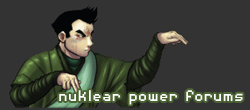

 |

|
|
|||||||
| Thread Tools | Display Modes |
|
|
#1 |
|
Everfree
|
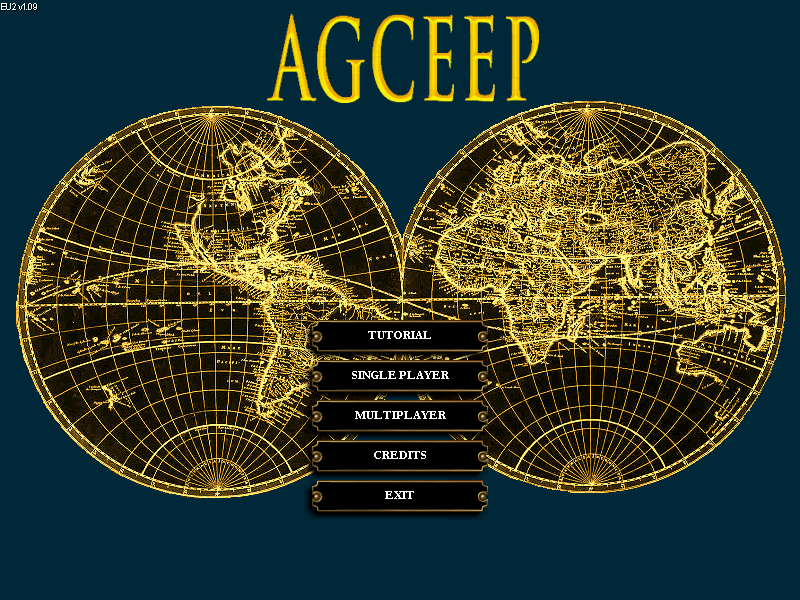 Ah, good old Europa Universalis. Let’s see what we can do here. 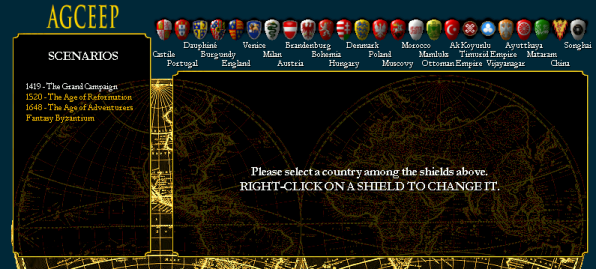 So... many... choices. I guess Songhai looks interesting. 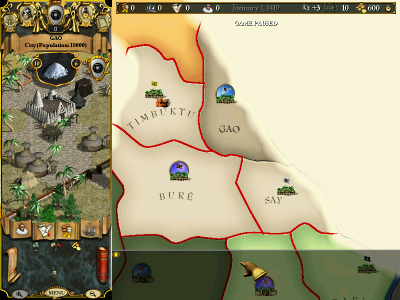 ...fuck. Let’s Be Terrible at AGCEEP. No, wait, that’s not right. Let’s Play the AGCEEP Mod for Europa Universalis II. Europa Universalis II is an historical RTS by Paradox Interactive. Paradox Interactive games are, of course, most well-known for being LPed fifty times, concurrently, on Something Awful. The AGCEEP is the Alternate Grand Campaign Event Exchange Project, which aims to expand the Grand Campaign and provide a greater wealth of historical events. So, what sets me apart from the crowd? Inevitable failure. Well, not really. But I am not even remotely a master of this game, and I’ve set myself up for an uphill battle. Also, this game is more out of date than those other LPs. What are my goals?
So come watch me flail around, wildly. IT’LL BE FUN! The Story So Far (You can use the links to get a separate post and so only load those few pictures at once). Bă I: 1419-1429 Opening with a Bang Bă II: 1429-1467 The Birth of an Empire Bă III: 1429-1499 Manifest Destiny Bă IV:1499-1512 Growing Pains --- Bă I: Opening with a Bang So, where was I? Ah yes...  Fuck... The Songhai Nation is little more than a small strip of land now. However, Sonni Muhammad Fari has big dreams. He swears that these days will simply be the seeds of a long history of Songhai greatness. 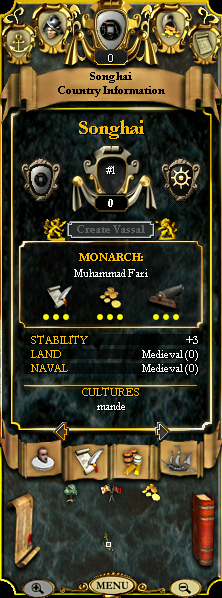 Sonni Muhammad Fari is a fairly well-rounded. He is a capable, even above average diplomat, administrator, and military strategist. His insights in all areas will form the backbone of Songhai ascension. However, the difficulties to be surmounted are not small by any means. 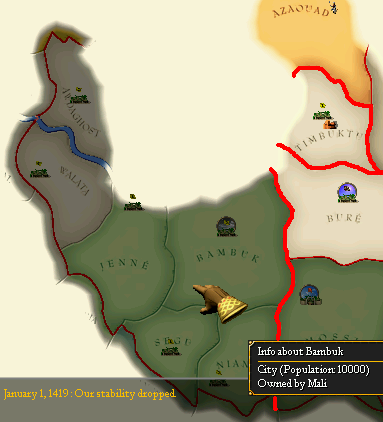 Mali (the area within red) controls nearly four times the area of the Songhai Nation, and will be our primary opponent during the move towards Songhai excellence. They hold land to which we Songhai lay a rightful claim, and the riches of Timbuktu, Jenne, and Walata hold great riches that call to Sonni Muhammad Fari and the Songhai People. Bambuk also has a significant, though lesser, amount of wealth.  The Mossi People own the single territory of Buré. This territory is vital to the expansion of the Songhai Nation, purely because of its position. Mali must also be eying it to connect its main territory to Timbuktu. 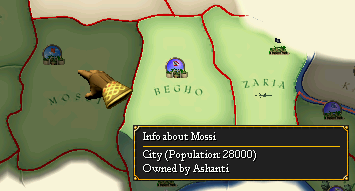 The Ashanti also own a single territory: Mossi. The Ashanti may prove a problem to the exaltation of the Songhai Nation, but Sonni Muhammad Fari fears little from them. If they do prove bothersome, they will be easy to deal with, in the face of the glorious Songhai armies. 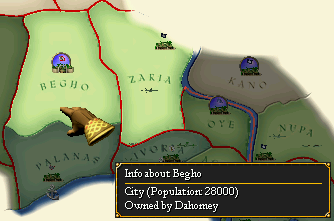 The nation of Dahomey owns the dual territories of Begho and Palanas. They are, by no means, a power, but they aren’t as weak as the Mossi or Ashanti. However, they have coastal territories that may prove useful to Songhai expansion in the long run. And, it’s doubtful that the Dahomey would be able to face the might of the Songhai in battle. 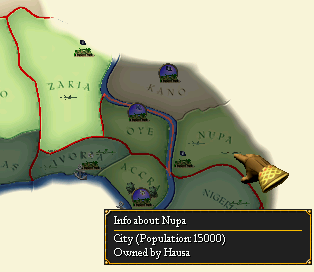 Zaria, Kano, and Nupa are owned by the Hausa, a fairly powerful nation in the region. Hausa power mostly comes from their close relations with their neighbors. 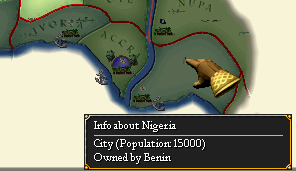 Benin, owning the teritories of Ivoria, Accra, and Nigeria are the other three-territory power with Hausa. Benin and Hausa are powerful because they tend to ally with one another. Where Hausa tend to be weak in the arts of war, Benin has been known to summon up massive armies, but they tend to be benevolent with their power. They will serve as useful allies, but their lands would be better served under the glory of Songhai rule. 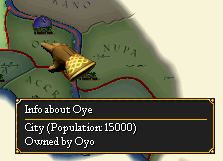 Oye, ruled by the Oyo people, is the third part of the triumvirate, and an unusual nation. Though a single-territory nation, the Oyo people have been known to summon up massive armies and continual armies. Oyo and Benin together make the eastern seven territories a power together. More than a match for Mali, even. Far from normal, the single-territory Oyo will be a difficult enemy, even for the glorious Songhai soldiers. However, that power would be put to much better use under Songhai guidance. 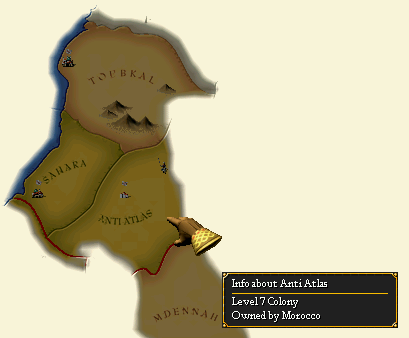 Lastly, Morocco is the most powerful nation in the area, particularly for its allies and stories that filter down from the broader world. Though, despite their stories and armies, they will be no match for the Songhai when their time comes. I actually know from one of my two earlier games that I can build a small army of 10,000 cavalry or so and go on a rampage up through Morocco, completely. However, doing so will not only tend to piss people off, it will piss people off just as I become known to colonial, European powers. 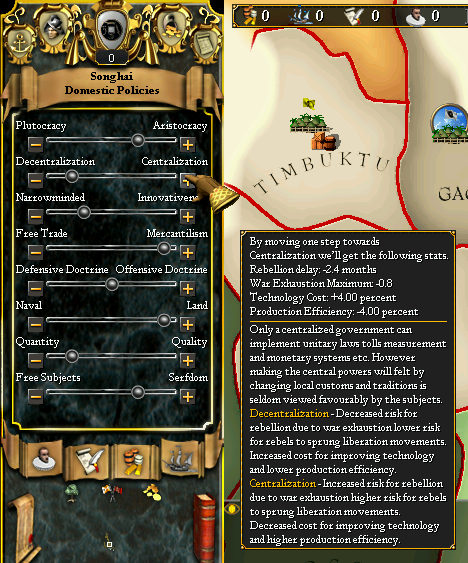 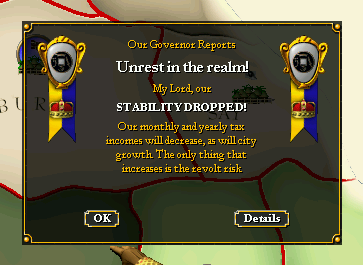 The great Sonni Muhammad Fari grabs the imagination of the Songhai people, and takes a great deal of power to fulfil his great dream for the Songhai. He, in the eyes of many, oversteps his bounds as a Sonni of Gao, and there is a minuscule amount of civil unrest. 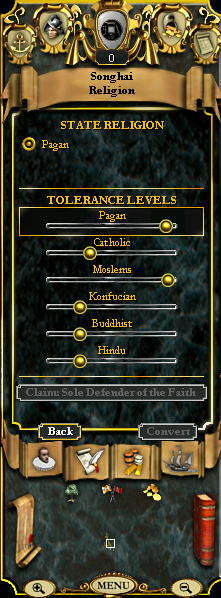 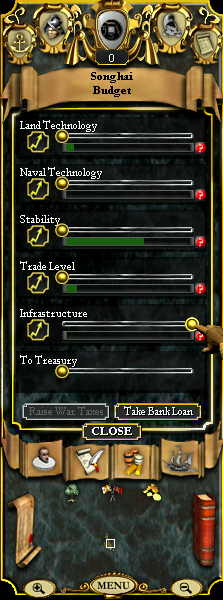 In an attempt to pacify the people, he reorganizes the Songhai’s policies in regards to Moslems, who make up a significant portion of the Songhai population. He also begins a process of improving the Songhai infrastructure, as a powerful base for Songhai expansion.  The effort seems to work. About four months later, people accept the new Sonni’s powers. This period of quiet acceptance doesn’t last. 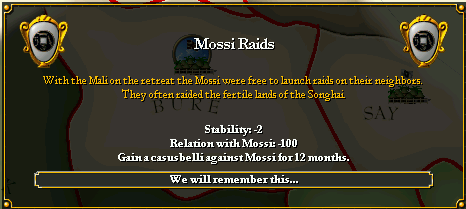 In October, of1419, the Mossi raid our lands after driving back the Mali. People blame the Sonni and unrest pervades Songhai. It does not cut deep, but this injustice shall not stand! The Mossi shall pay for what they have done to us! 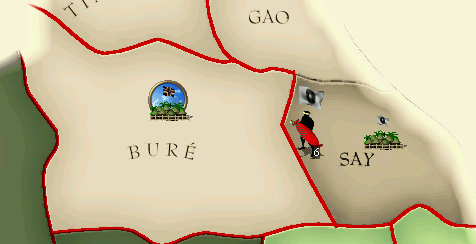 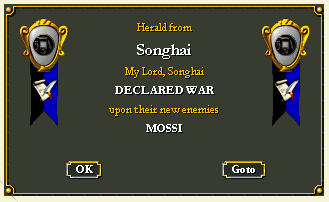 At the start of 1420, the Sonni orders the conscription of 6,000 horsemen in Say, and mere days later, the Songhai Nation is at war with the Mossi. Our glorious armies ride on Buré. 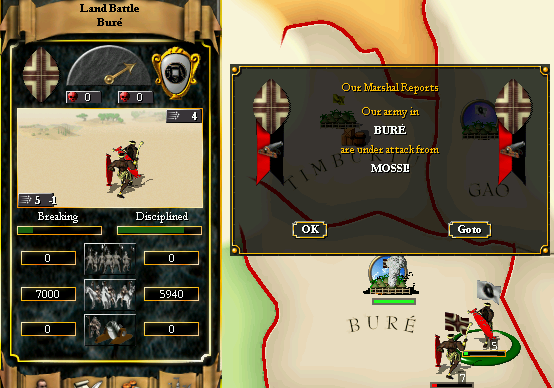 We ride unopposed in the early war. The Mossi rallies an army of a mere 4,000 conscripts, who are promptly slaughtered as they leave the gates, barely trained. A mere 1,000 survive and flee to Gao, and turn back to liberate the sieged capital of Buré. Their pathetic recruits make no dent in the magnificent Songhai forces. 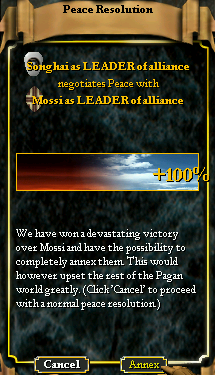 There’s little left for Mossi to do but fall, which they do, as fall wanes to summer. We add their land to our nation. 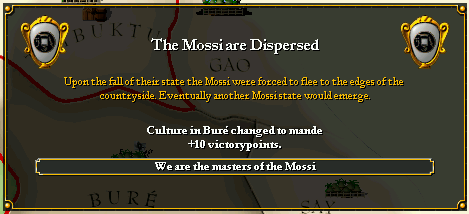 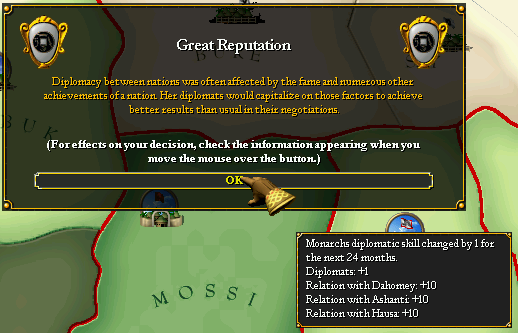 Mere months later, the last of Mossi influence fades in Buré. They claim they shall return, but the Songhai know no fear. We are the masters of Mossi, and our nation is on the rise. Many people in the region had no love of the Mossi, and Sonni Muhammad Fari and the Songhai find themselves praised by the Dahomey, Ashanti, and Hausa. 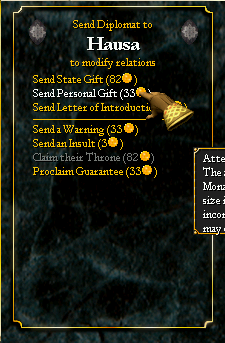 Sonni Fari takes advantage of this opportunity by sending a relic of the fallen Mossi to the lord of the Hausa, one of their leading opponents. The message is clear, our might may serve the interests of the Hausa for now, but their relics will sit with the leader of another land if they trifle with our armies. 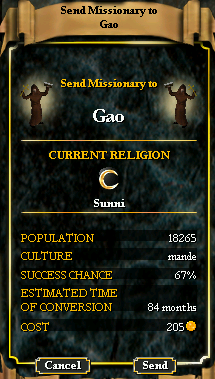 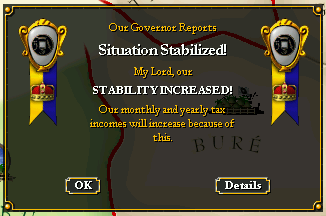 In March of 1421, the majority of the Songhai Nation has recovered from the seeds of discord sown by the Mossi during their raids nearly a year before. A peaceful calm sets over the nation, mostly. But the Sunni Moslems of Gao are proving somewhat resistant to the powers of Sonni Fari, fearing he has forgotten his Moslem heritage in the face of the Gods who watch over the Songhai Nation. Certainly, he has not forced the Moslem principles on the people of Songhai. As a consequence, they aren’t cooperating with the administrators and servants of the Songhai Nation. Production and tax revenues suffer, and Muhammad Fari, Moslem or not, sees this as an opportunity to rid Gao of their obstinance. 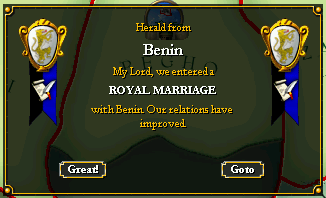 In the meantime, our Sonni continues to build relations with the nations to our southeast, hoping to see their alliance break, and to be in a position to reshape the power they wield. To that end, he marries off one of his many daughters to the lord of Benin. 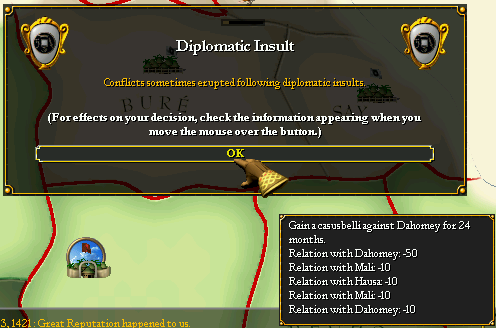 The Dahomey, obviously jealous of our choice of Benin over them, insult our glorious nation. We are embarrassed in the face of the allies we have built, and all our work in demonstrating our power is damaged. We cannot allow this to stand! 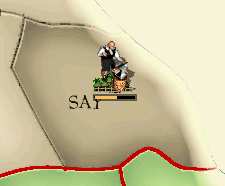 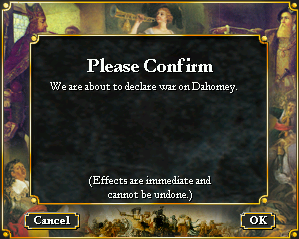 Dahomey must pay! Our plan is simple. We quickly conscript a force of 13,000 cavalry and infantry, and they ride down to Begho, the capital of the Dahomey nation. From there, they will split into two forces. One will siege Begho, the other will ride south, towards Palanas. 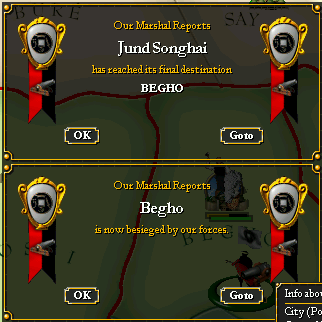 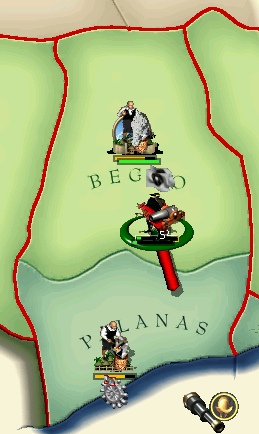 We quickly cut Begho off from outside help, and the charge on Palanas begins. So far, Dahomey hasn’t had a chance to respond. 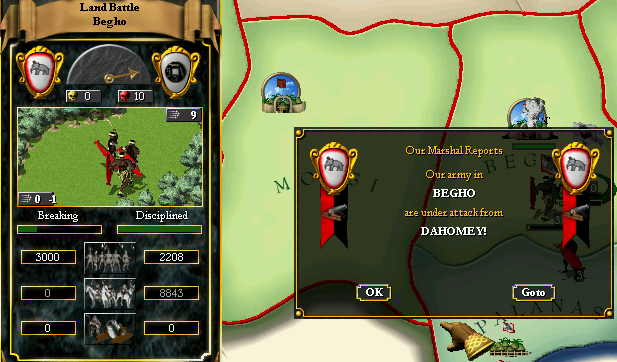 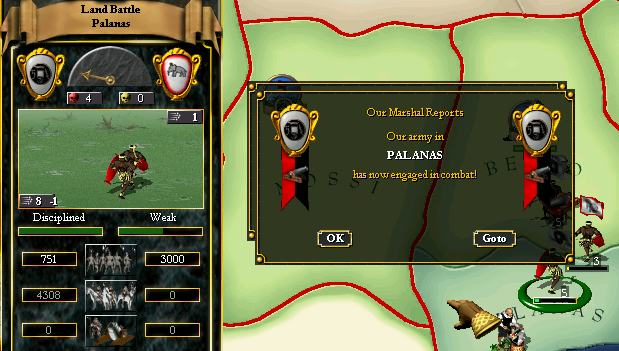 Finally, their conscripts, 3,000 infantry, attack our soldiers at Begho. Fresh, untested recruits, they are slaughtered and driven towards Palanas, where they are slaughtered again. More completely this time. The infantry of Palanas bear the same fate. An army of 5000 suddenly appears in Begho and drives us out. The army appeared quickly and quite randomly, I was too startled to grab a screenshot. But we quickly gather new recruits and march back down. 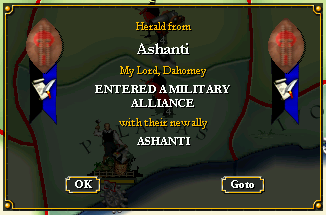 At this point, Dahomey calls Ashanti into a military alliance. We fear that the Ashanti forces will push this turn of fate, and hurt our plans further. Nothing materializes. 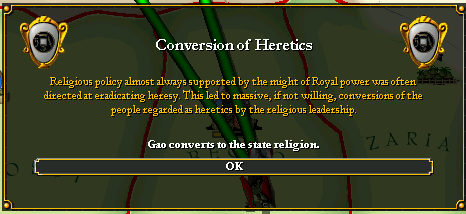 The Moslems of Gao are converted before we expected. A number of them die in our armies against Dahomey. Whispers play in Gao that, once the army has crushed Dahomey, it will turn on the Moslems. The resistance to the true Gods of Songhai fades. 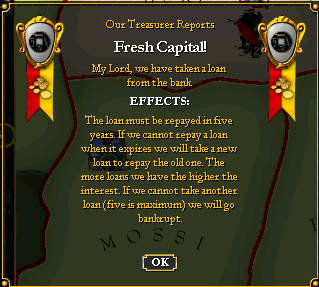 So fades our treasury. We are forced to take loans of goods from surrounding countries. The interest will be a massive drain on our economy, forcing us to mint more money, which in turn, will drive up inflation. Inflation will be a massive drain on our economy. 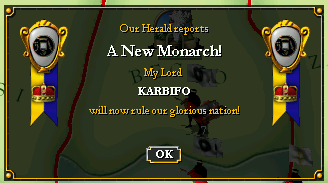 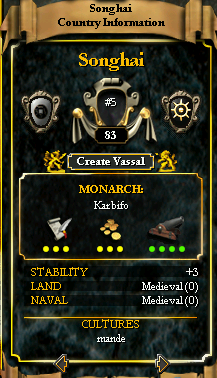 This is the last news our glorious Sonni Muhammad Fari will hear. In January of 1426, as the war with Dahomey continues on, and inflation begins to rear its head in Songhai, Sonni Fari dies and his son, Sonni Karbifo rises to the throne. Sonni Muhammad Fari, the great dreamer who began the ascent of the Songhai Nation, is a loss that will be long mourned. Karbifo is a better warrior than Muhammad Fari, but keeps in his tradition by maintaining skills in diplomacy and adminstration. But, he must take the reigns of our glorious nation quickly, as the war with Dahomey drags on. 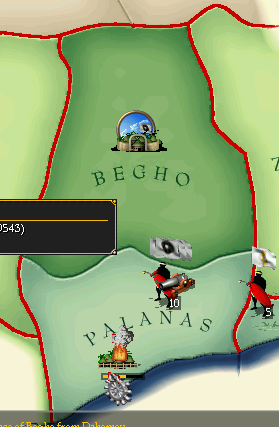 In September, the province of Begho has fallen entirely. Palanas follows suit quickly, but before it can, the lord of Dahomey swamps us with countless courtiers and diplomats, begging an end to the conflict. In honor of Honored Sonni Muhammad Fari the Great Dreamer, Sonni Karbifo declines. Nothing short of total victory will be acceptible. 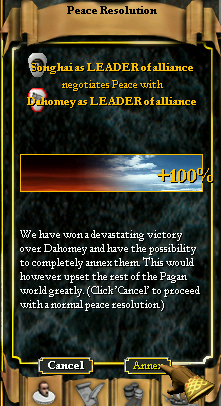 It is what the glorious nation of Songhai obtains. Statues of Sonni Muhammad Fari now grace the centers of each and every major city in Begho and Palanas, our first such act, and the mark of the birth of true greatness of the Songhai Nation. 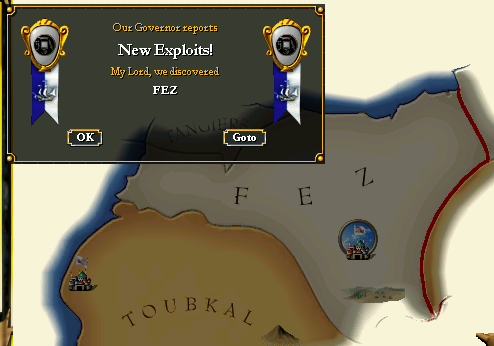 In September, seven months after the war that ended Dahomey, some of our people return from trips to Morocco, speaking of its capital province: a place called Fez. Sonni Karbifo sends envoys to gather news from Fez, to keep an eye on the powerful Morocco and their allies from beyond the sea. 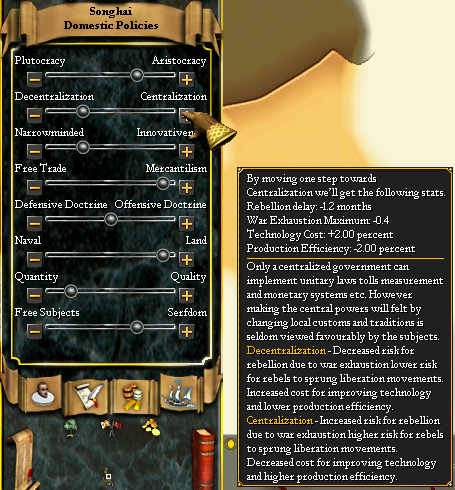 With two new provinces under Songhai rule since Sonni Karbifo’s rule, and a jubilent populous, Karbifo takes the opportunity to consolidate more power of the Songhai Nation directly under his rule. This would be his country, and he would shape it like his father had before him, and his son would in time. This first decade has been good to the Songhai Nation. Hopefully, Sonni Karbifo can lead it just as well in the future.
__________________
FAILURE IS
LEARNING TO ACCEPT THOSE THINGS I CANNOT CHANGE Last edited by The Kneumatic Pnight; 03-10-2008 at 10:09 PM. |
|
|
|
|
#2 |
|
SMARTASS
|
Well, this looks interesting. I recommend using your new-found Naval powers, (Gained from Pallanas), and explore the lands farther away. Feel free to bring a large fleet and conquer those lands while you're at it.
__________________
Do geese see god? Everyone is an asshole. Including me. Especially including the double asshole who read this and nodded smugly. |
|
|
|
|
#3 | |
|
Everfree
|
Quote:
The practical upshot of this is that I, somehow, can't even remove my ships from dock. There was one in there that I took, and I couldn't move it. Now, supposedly, ships will occasionally "explore" adjacent territories, so, if I could get them out of dock, I could do stupid tricks like make them move back and forth constantly until I see adjacent lands and then repeat with the other lands! But now, I can't even explore the waters just outside my port city. I will be looking into a way to declare war on the sea. I don't hold out much hope.
__________________
FAILURE IS
LEARNING TO ACCEPT THOSE THINGS I CANNOT CHANGE |
|
|
|
|
|
#4 |
|
SMARTASS
|
Can't you conquer the lands of adjacent people who can see into the ocean? Someone must have managed it.
Also, Tankspam is always the answer
__________________
Do geese see god? Everyone is an asshole. Including me. Especially including the double asshole who read this and nodded smugly. Last edited by secretskull; 03-02-2008 at 11:37 AM. |
|
|
|
|
#5 | |
|
Everfree
|
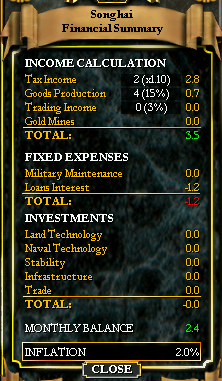 Sonni Karbifo struggles to pay off the loans acquired to fund the Great Dream of the late Sonni Muhammad Fari. The interest payments take up nearly a third of the income we produce, and interest has risen to two percent. But, the result is the conquest of Dahomey, more than doubling the original size of the Songhai Nation and giving us access to a port city. Admittedly, we know little of the waters or what is beyond them, but we shall eventually, once the Songhai Nation stretches to the very edges of the earth. 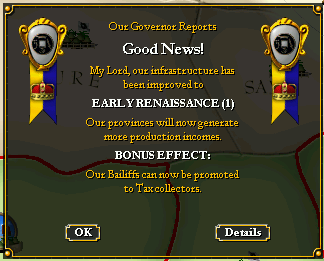 The Songhai Nation becomes more efficient as we learn to codify laws and employ effective forces to increase tax revenue. 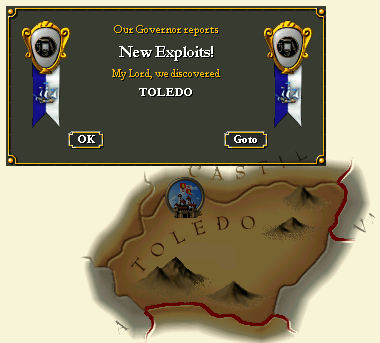 News filters down from Morocco of lands across the sea. The most important seems to be one called Castile, who are building an empire of their own. Their capital is in a realm called Toledo. Perhaps our two goals may coincide in the future. In either case, we shall have to keep an eye on them. 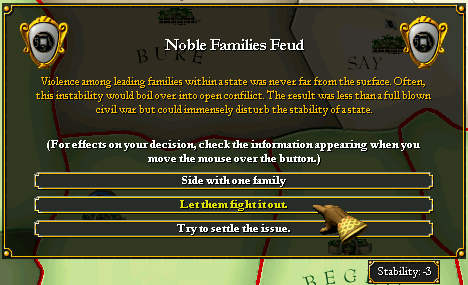 Songhai nobles begin to argue about control over the Dahomey territories. Unfortunately for Sonni Karbifo, Songhai cannot spare the money to settle the issue or to simply squash it, so he excuses himself from any meetings with their envoys for several weeks. Tensions inflame; thankfully it doesnt go much further than that, though people may be losing faith in our great leader. 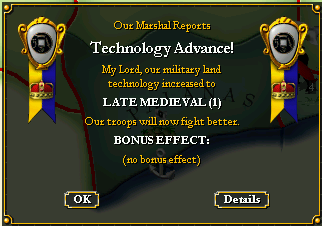 Instead, our Sonni confers with a number of strategists, and a codified form of military strategy emerges. This should make our troops more effective in expanding and protecting the Songhai Nation. 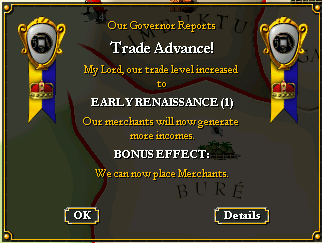 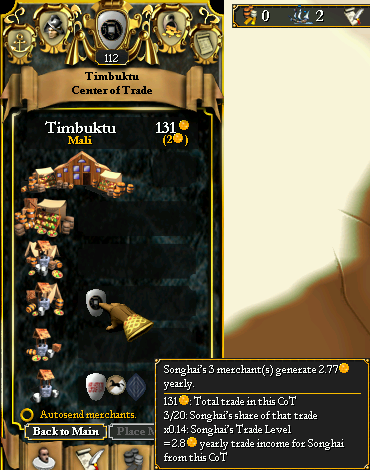 Some of the travelers who brought us news of Fez and Toledo speak of whole classes of buyers and sellers in those nations, and many nations beyond the seas. We duplicate their methods of bartering and setting up shop, and soon we have a firm position in the trade hub of Timbuktu. 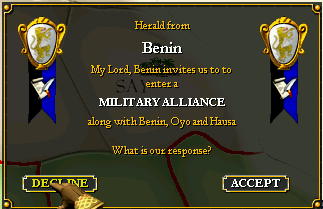 Benin, Oyo, and Hausa see us as a valuable ally. They are right, but perhaps were not right for them. Sonni Karbifo wants nothing to do with their politics, nor to be strong-armed into wars he cannot plan. We decline. 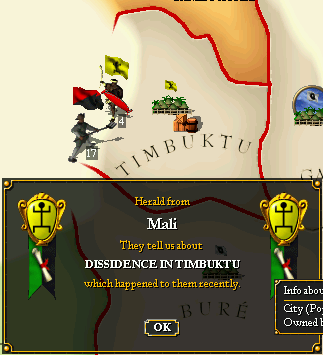 Mali is losing control over Timbuktu. In no small part, perhaps, because we control the routes to and from their territory. 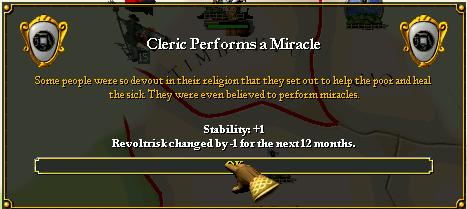 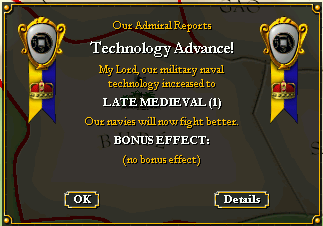 The Gods favor the great Songhai Nation. Our shamans perform miracles that rally the populous, and those who work on the docks of Palanas design a better ship hull. Our might knows no rival on land or sea. 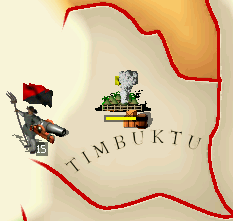 In April of 1433, we receive news of the rebels sieging the capital of Timbuktu. Malis false god does not smile on them, it seems. 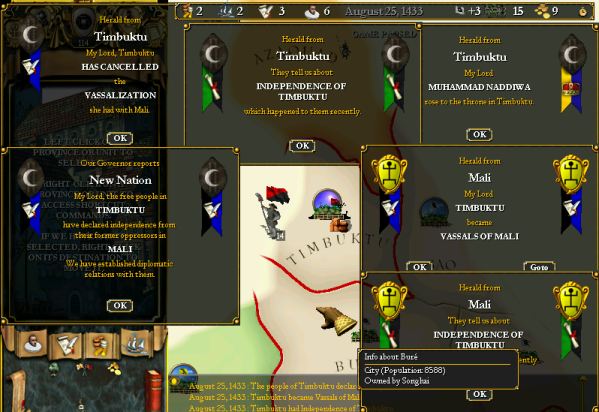 In August, pretenses are dropped. Timbuktu has not been Malis for months. Now, they fly their own flag, bow to their own king, and worship their own false god. 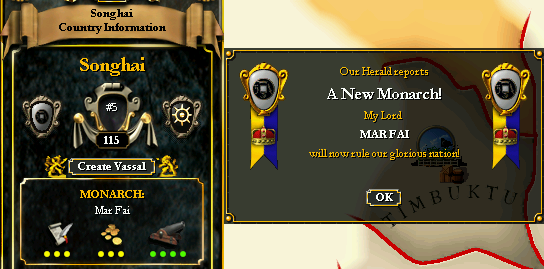 With this happy thought in his ears, Sonni Karbifo dies comfortably in his sleep, succeeded by Sonni Mar Fai. Mar Fai learned, it would seem, the same lessons as Karbifo, and is skilled in nearly the same ways as our old monarch. Policies dont change much. 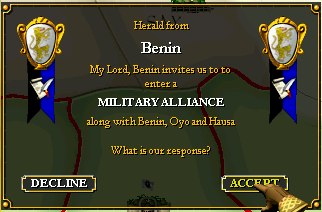 Except in one way. Sonni Mar Fai is much more receptive to the alliance offers of Benin than Karbifo ever was. We now have the power of those three nations backing the glorious Songhai. 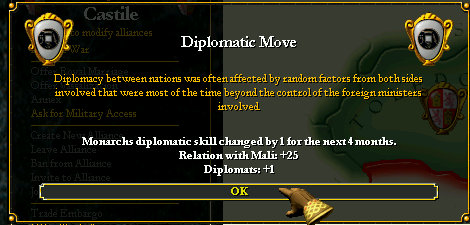 The result is a much more open Songhai. Mali seems to see us as less militant than before and some of our people are eager to advance this new era of diplomacy. 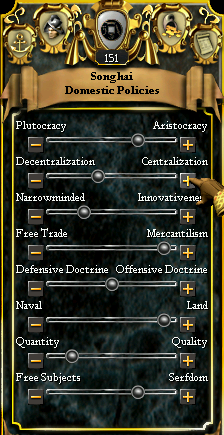 As all the Sonnis before him, Mar Fai collects more and more power under his rule. He begins to establish a true kingdom around a palace, and a series of officials to run it. 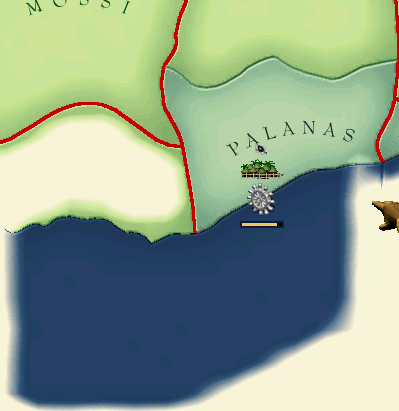 He orders the construction of a fleet and it scouts the seas off the coast of Palanas. Little is found, and we see no reason to travel much beyond our coasts when there is so much land to be had. We will rule the seas in our own time. 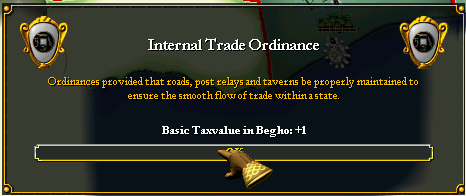 Mar Fais consolidation of power and establishment of laws sees the slow strengthening of infrastructure in the Songhai Nation. Begho is the first to benefit. 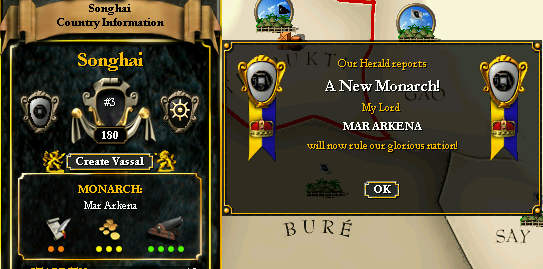 After only eight years, Mar Fais open policies have angered some within the nation. With the backing of a consortium of nobles, Sonni Mar Arkena convinces Mar Fai to step down. He retires to a comfortable life in the country. Mar Arkena is a much less diplomatic man, but contrary to the supporting nobles beliefs, he will not simply kowtow to them. 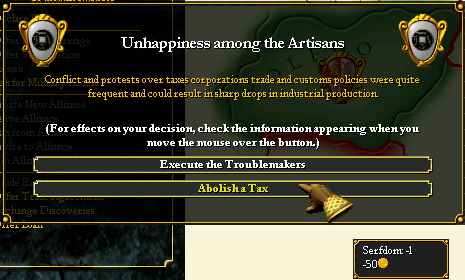 He first abolishes a tax on the growing artisan class. The middle class begins to thrive, weakening the traditional hierarchy of the Songhai Nation. 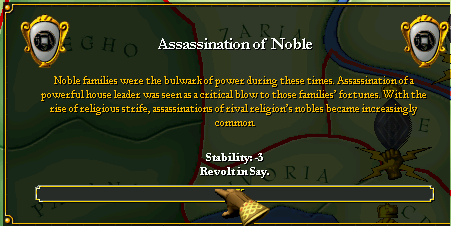 The nobles begin to respond unfavorably. They work to depose Mar Arkena, but soon the leader meets an unfortunate end. The rest of the nobles organize their serfs in revolt in Say, but Mar Arkenas royal guard quickly crushes the rebellion. 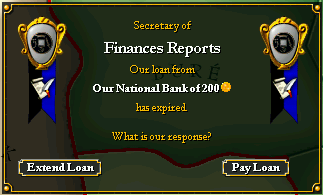  The loans that Sonni Muhammad Fari the Great Dreamer took out all those years ago are all, finally paid off. The payments will no longer be a drain on the economy, but inflation has reached four and a half percent. It will take more than that to slow down the glorious Songhai Nation. 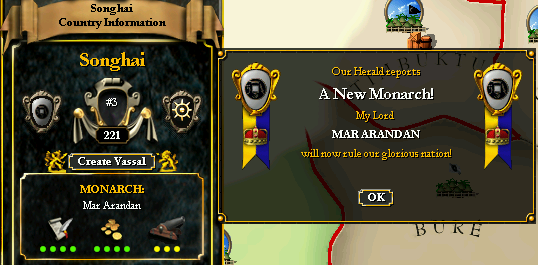 In 1449, seven years after Mar Arkena took the reigns of Songhai, Sonni Mar Arandan, a diplomat and an administrator, organizes Mar Arkenas step down. He is ushered into hiding from the nobles who still detest him and Sonni Mar Arandan now rules the Songhai. 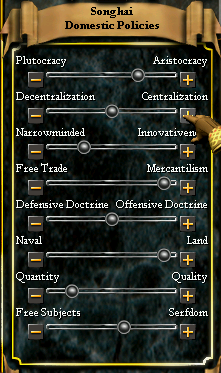 With an iron fist. 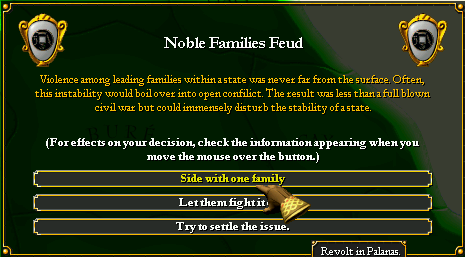 Sonni Mar Arandan is decisive in the matters of noble feuds. He cares little for their control over the Songhai. Nominally, when they feud, he sides with one noble family, but slowly he works a wedge between them. 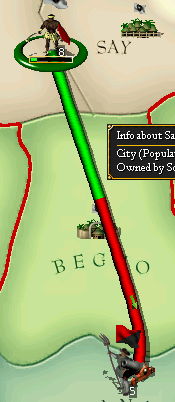 The Sonnis forces quickly crush the noble supporters who revolt in Palanas. 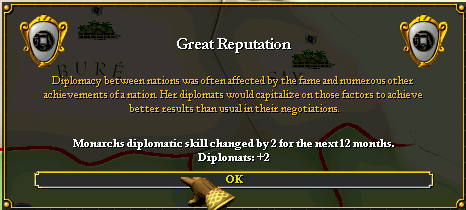 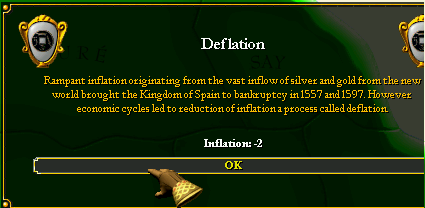 He also begins open relations with the countries that surround the Songhai Nation with his significant diplomatic ability, and his administrative talents also lower the inflation that drains the Songhai economy. 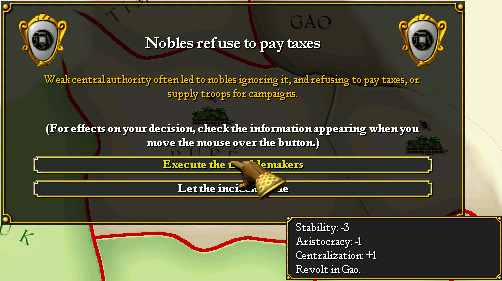 The nobles who Sonni Mar Arandan supported in the feuds begin to think highly of themselves. They place themselves over the welfare of the glorious Songhai Nation. Mar Arandan puts them in their place quickly. 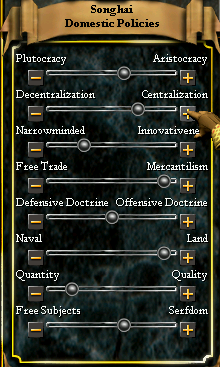 With an iron fist. 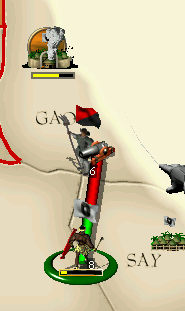 The nobles revolters are pathetic in the face of the glorious Royal Guard. 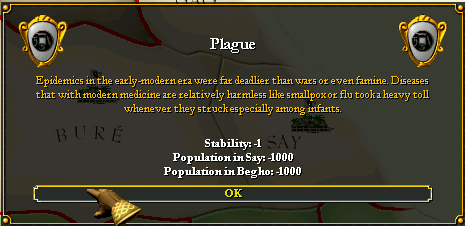 In July of 1461, a plague strikes the Songhai. People are shaken, but Mar Arandan holds the nation together. He spends the next two and a half years organizing care of the sick and restoring the faith of the people in the glory of Songhai and its rulers until he dies a weary death. 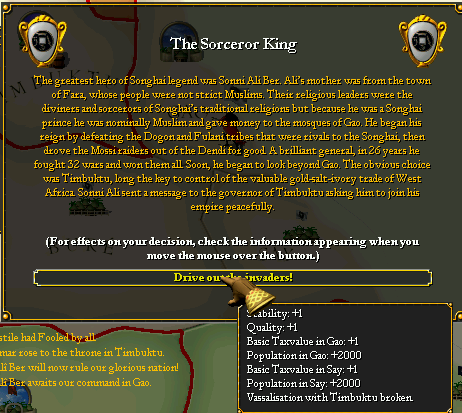 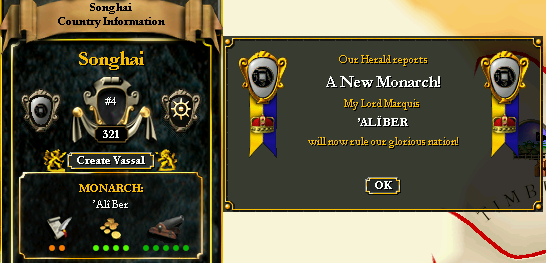 In January of 1464, the Sorcerer King `Alī Ber relieves Mar Arandan of the tiring crown of Sonni. He is as fine an administrator as Mar Arandan, but half the diplomat. However, `Alī Ber truly shines in the art of war, and works personally with the administrators and nobles of Songhai to further their military might. 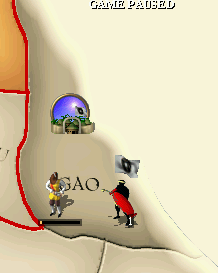 He commands his own personal army, the Jund Songhai and begins the steady enforcing of taxes within Gao as the continuation of Mar Arandans campaign. 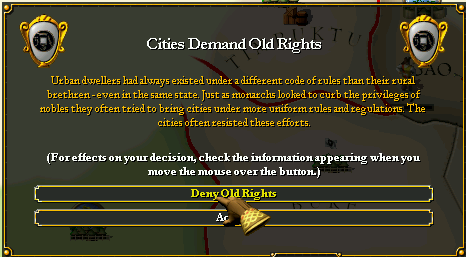 The cities and nobles of Gao petition against the marginalization of their special privileges. `Alī Ber pays no mind. The people are brought about to his point of view. 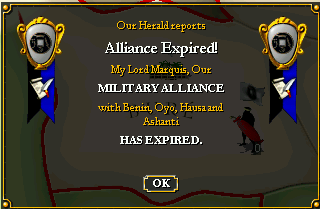 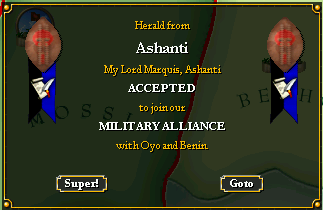 The alliance with Oyo, Benin, and Hausa runs its due course. `Alī wastes no time in reshaping the alliance in his own image. 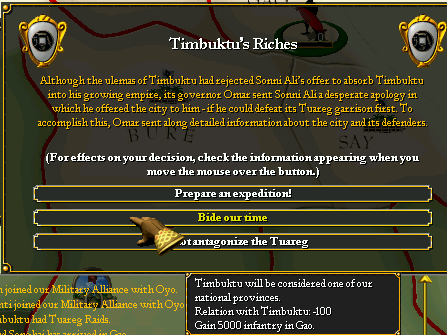 In February of 1466, Timbuktu calls upon the glorious Songhai armies to free Timbuktu from internal, Tuareg tyranny. `Alī Ber bides his time. 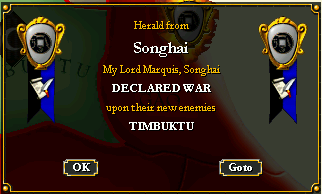 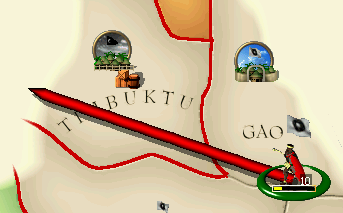 But not for long. In March, the Jund Songhai, 10,000 strong and with `Alī Ber at the head, marches on Timbuktu. 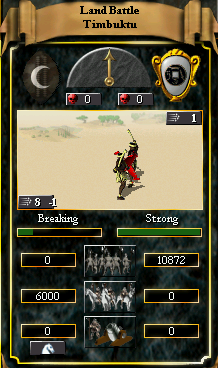 The Tuaregs are pathetic in the face of the mighty Songhai infantry. 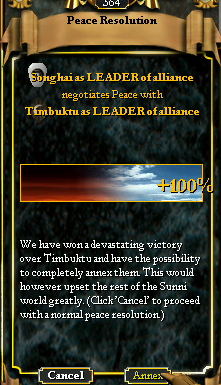 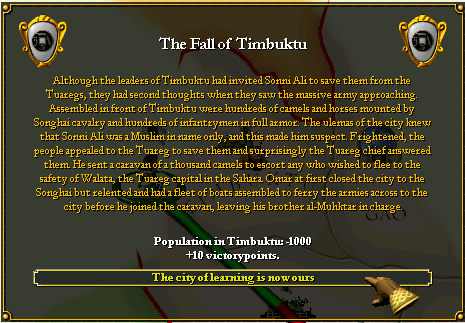 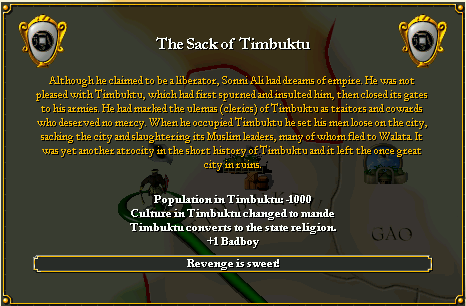 Timbuktu is ours. And Sonni `Alī Ber decides to give the foreign Tuaregs, and the Ulemas of the false, Mali God what they deserve. 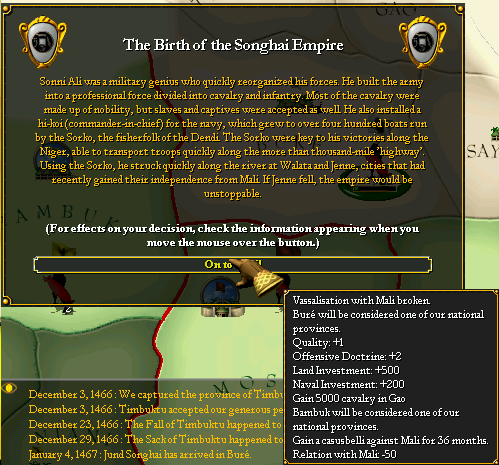 And soon, the rest of the world. The Songhai Empire is born. --- Quote:
__________________
FAILURE IS
LEARNING TO ACCEPT THOSE THINGS I CANNOT CHANGE |
|
|
|
|
|
#6 |
|
SMARTASS
|
Awesome to the max! I was wondering; what does moving the Narrow-Minded/Innovative bar do?
Also, now that you're in a military alliance with Benin, Hausa and Oyo, do you have anywhere you can still expand your empire into?
__________________
Do geese see god? Everyone is an asshole. Including me. Especially including the double asshole who read this and nodded smugly. |
|
|
|
|
#7 | |
|
Everfree
|
Quote:
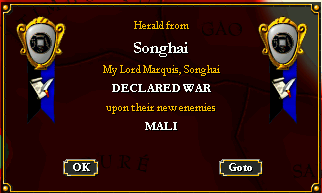 The new Songhai Empire needed to expand, and the ominous hand of Mali to the west of us nearly ached to be driven further west. We decided to oblige. Our allies, we decide, would only get in our way, so we fight this war alone. 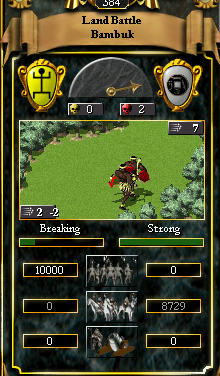 Our only forces, the only forces necessary—a cavalry nearly 9,000 strong—ride on the Mali capital of Bambuk. They hastily conscript 10,000 soldiers to meet us, but our glorious forces rout them amid a slaughter. 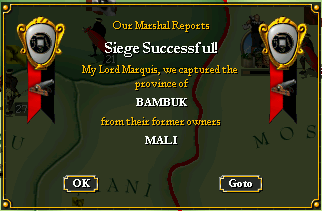 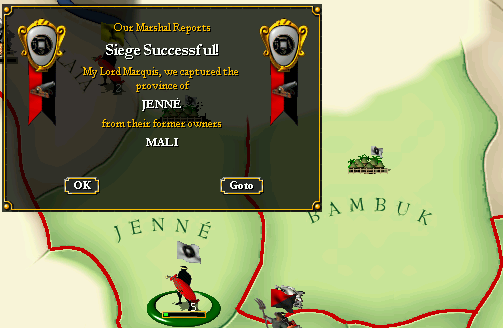 Bambuk falls in days, and those Malians loyal to the Songhai and their new empire wrest control from the Mali overlords. Our forces move on to Jenné and it’s lucrative gold mines. The Mali soldiers had apparently fled in anticipation of our coming, the province was ours. 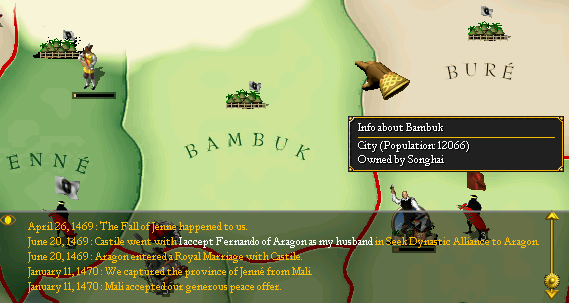 We offer Mali a reprieve from our overwhelming assault, taking our rightful ownership over Bambuk and Jenné. The wealth of gold in Jenné calls to us, and we install a branch of overseers and tax collectors to make sure the empire gets its right control over the gold produced. 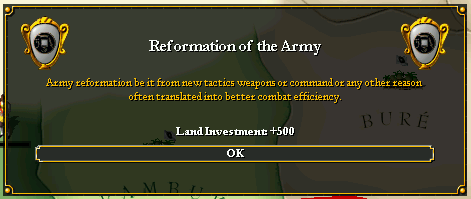 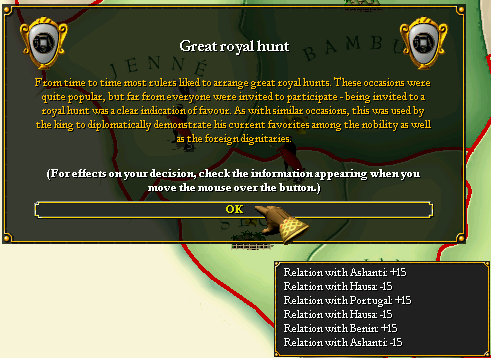 Our overwhelming victories over Dahomey and Mali, two former powers in the region, teach us much of war. And the great Sonni `Alī Ber uses this knowledge to restructure the army. The Songhai are becoming renowned as warriors. `Alī Ber takes advantage of this newfound renown, even in lands distant to the Songhai Empire’s humble start, to host a week long festival of hunting and feasting in celebration of our defeat over Mali. This was the birth of a tradition that would slowly be adopted by many great men, even in distant lands, who would later return to our lands to relive the hunt. 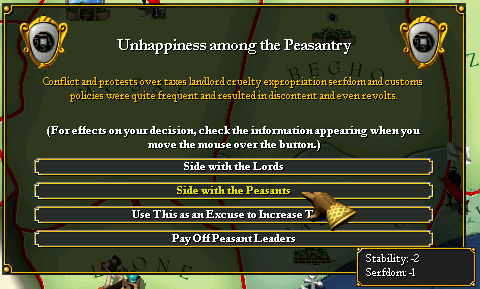 This show of decadence by Sonni `Alī Ber was soon imitated by the nobles of the land. The Songhai leadership was soon using the peasants of the land to fund their expensive shows of power. The growing discontent of the peasants at the higher taxes and fewer services of their lords was dwarfed only by `Alī Ber’s anger with the wastefulness of the nobles, and the wrath with which he cut away at their powers over the serfs. It was slowly becoming fashionable to strip the nobility of their hereditary powers. 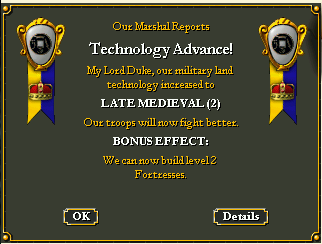 This power was slowly given to the meritocratic imperial army, and the result left them more effective. 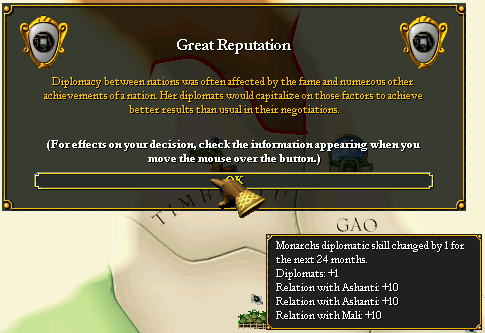 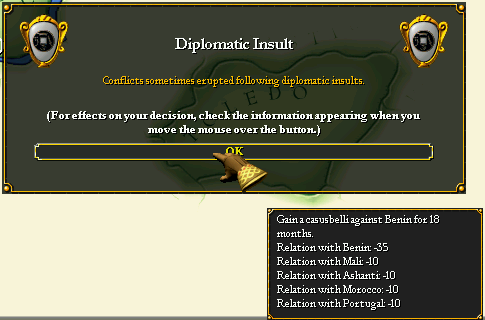 `Alī Ber was becoming known as a man kind to the common man, and the Songhai Imperial Army was becoming known as one of the greatest around. Our reputation knows no bounds. Benin disagrees with our claims of the glory of the imperial army. `Alī Ber quietly makes plans to demonstrate the power to them. 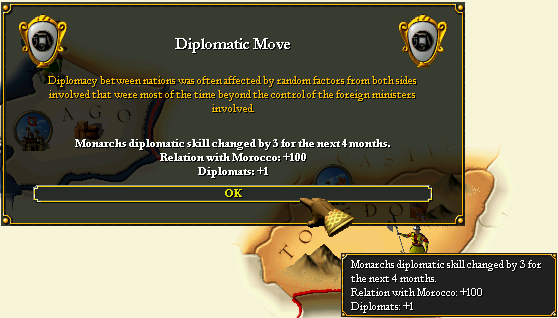 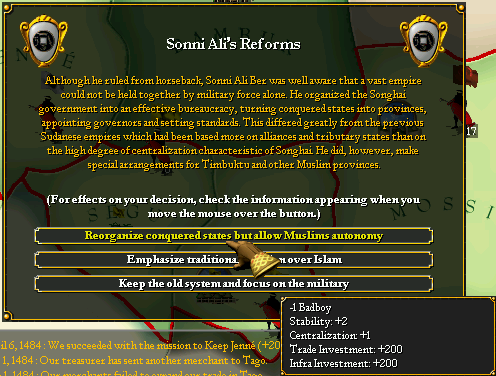 A quiet discussion with Morocco to the north leaves the Moroccan government unusually pleased with us. They silently donate a contingent of horsemen to our plans. In exchange, when `Alī Ber reorganizes the empire’s ruling structure, he allows the Moslems a great deal of autonomy to pursue their worship, such as it was. The true Gods of the Songhai would deal with the Moslems in their own way. 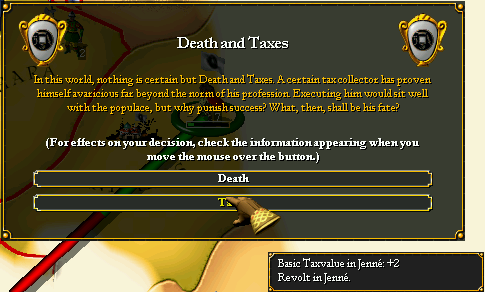 In Jenné, peasants petition against our tax collector. `Alī Ber finds that he has raised taxes on his own and was pocketing the difference, and decides to rectify the situation. Now, the great Songhai Empire pockets the difference. 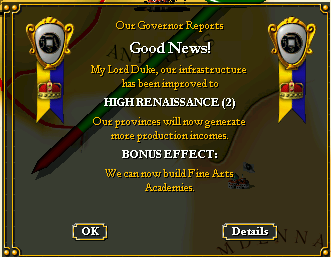 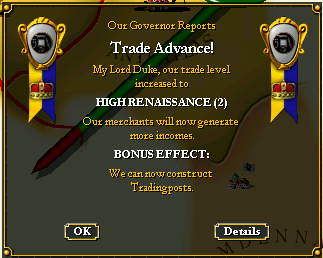 Our great Sonni is soon petitioned by various artists who wish to establish a school for the creation of art. `Alī Ber sees the worth of art to connect the Songhai to one another, so plans for such an academy are created, but filed away for a more opportune time. The growing merchant class of our empire offers us a similar idea to create trading posts in distant, but wealth-filled lands, but all lands we know are claimed. 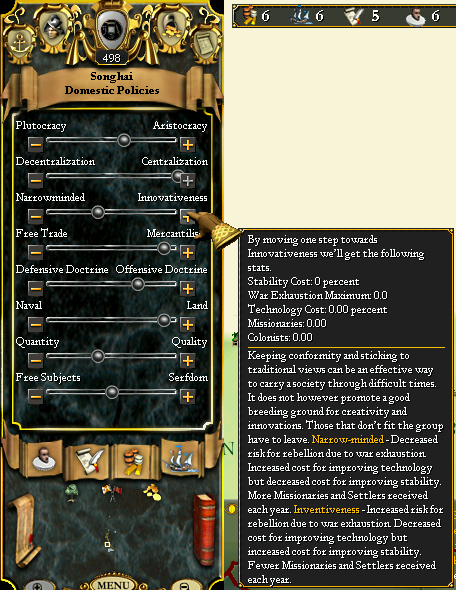 But one thing is clear, the glorious citizens of the Songhai Empire are becoming more clever. `Alī Ber decides to encourage this. Invention is glorified, and a system of schools begins to form throughout the Songhai Empire.  Fuck Portugal declares unprovoked war on the Songhai Empire. Portugal, being a land from across the sea, is untouchable to us... almost. But they have a small colony in Leone. 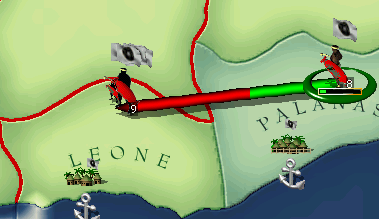 Imperial forces move in and secure the colony immediately, but there’s nothing left of Portugal to attack. `Alī Ber sues for peace, asking Leone as tribute. The Portugese oblige, and the war is done. Seriously, I don't know. I didn't screenshot the treaty acceptance, because I "knew" it was a failure, and then I realized in a second that the war was over.  Groups of colonists begin to flock to the coastal towns and lucrative gold mines of Leone. We couldn’t be happier. 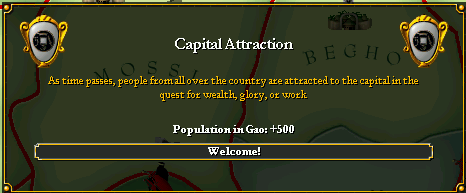 The growing empire begins to demand more in the way of military and administration. People begin to flock to the capital. We couldn’t be happier. 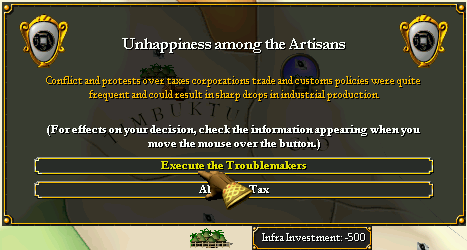 The artisans and builders of the empire begin to complain of the Sonni’s tax policies. `Alī Ber suffers no complaints, and the leaders of the strike are, themselves, stricken. 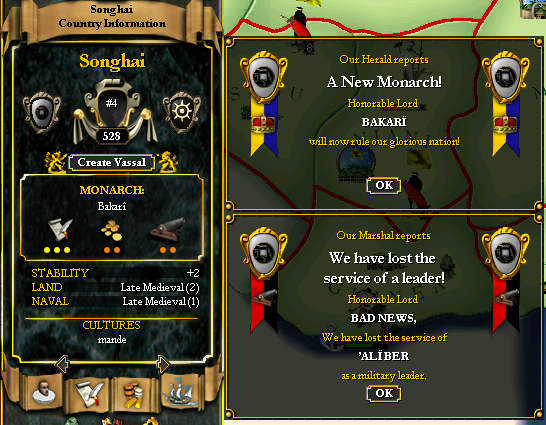 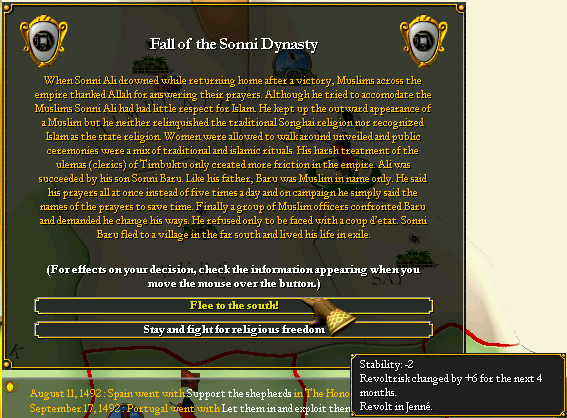 This will be Sonni `Alī Ber’s final act on the stage of administration. Soon after, he leaves to survey the imperial provinces, but drowns on his return. `Alī Ber’s son, the new Sonni Baru Bakarī is overthrown. Bakarī flees to the south. 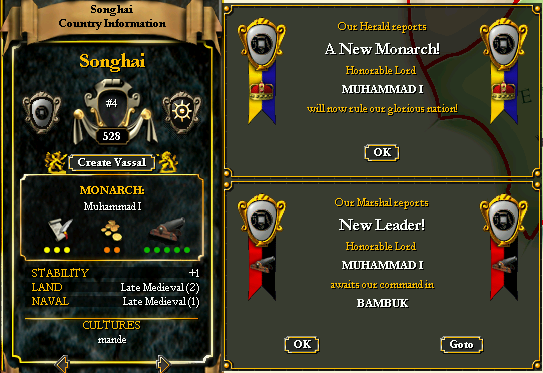 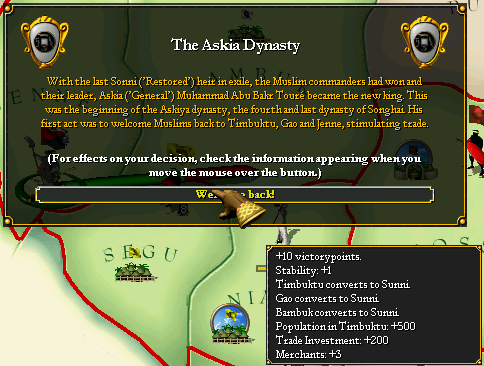 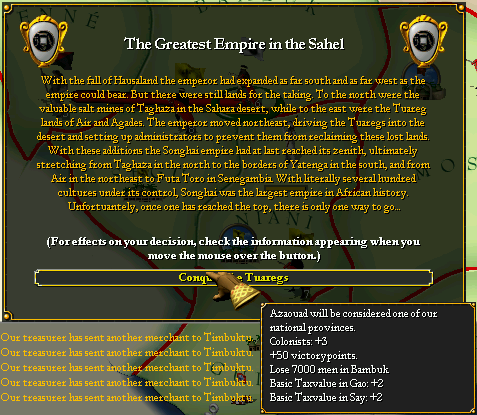 Askia Muhammad I takes his place, and begins to prove that the Moslem God smiled on the Songhai Empire. He lead the imperial forces, under the name of the Jund Songhai, and claimed the lands to our north. The Askia Dynasty had begun. 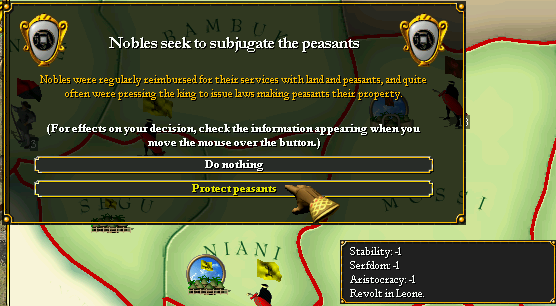 Askia Muhammad I sought to unify the peasantry under his rule, as they had followed `Alī Ber. He began to follow the tradition of stripping the Songhai nobility of their power over the peasantry. An army is assembled under the nobility to revolt, but Muhammad I leads the Jund Songhai to a quick victory. 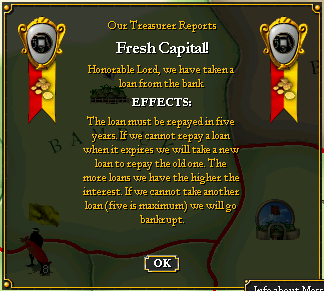 But not without cost. 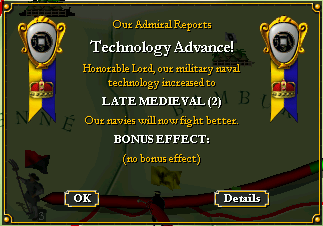 The small Songhai Imperial Navy attempt to refine our naval strategy, but the Askia sees little value in fancy boats. 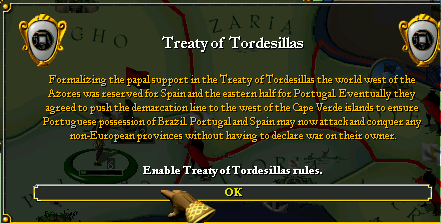 Word filters down from the north of the “Treaty of Tordesillas”. Two distant lands, Portugal and Spain, claim all of the world not their own to create their own empires. Perhaps our goals may coincide in the future, but they shall have to take the Songhai claims from our cold, dead hands. 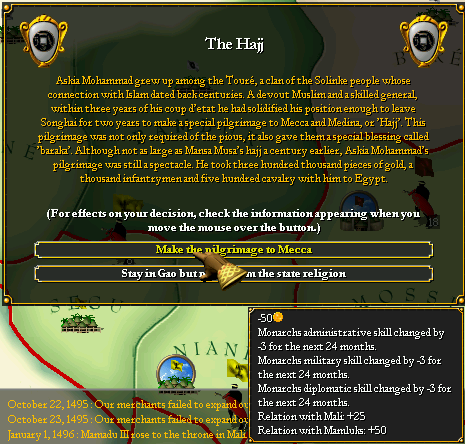 In January, Askia Muhammad I prepares for the Hajj, his pilgrimage to Mecca. He prepares a massive entourage and a tribute to bring Allah’s blessing to the Songhai Empire. 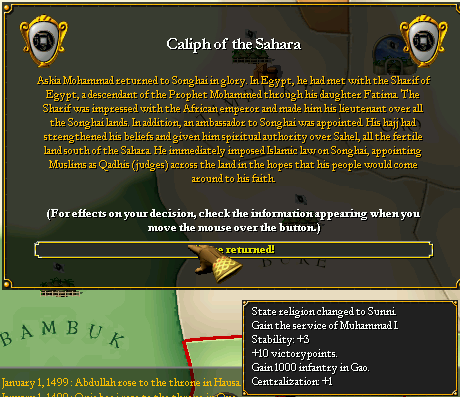 In return, it seems, the Songhai gains the favor of the Sharif of Egypt. Askia Muhammad I becomes the Caliph of all the Songhai lands, and a group of Moslem soldiers and administrators from Egypt return with the Askia. The Songhai government and military are further strengthened under the glory of Allah. ----- Bă IV:1499-1512 Growing Pains 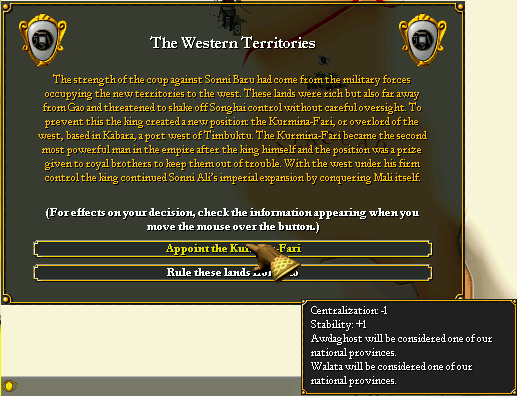 In February of 1499, the western provinces—an integral part of Askia Mohammad Ture’s coup, began to grow restless. The Askia was expected to grant his supporters in the west a number of favors that, in the light of the reigns of the Songhai Empire, were difficult. More importantly, they were beginning to behave with an amount of freedom that threatened the Askia’s new reign. To assuage these problems, the Askia created a position, the Kurmina-Fari, or overlord of the west. He offered the position to one of his greatest supporters in the west, and staffed numerous subordinate offices with similar supporters. Those who had fought beside him now had their prizes, and their own ability to control the western provinces. Many even had ties to other important people even further west, in the provinces of Awadghost and Walata; the latter province being rich in gold mines. The foundations of further expansion were beginning to come together as many of the minor rulers of those lands declared their loyalty to Songhai. Others would follow when the time came. 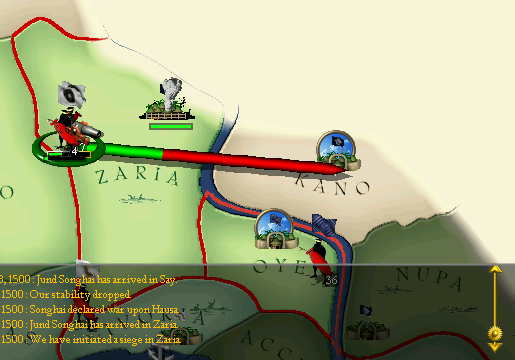 However, that time would have to wait. For now, Askia Mohammad I saw the opportunity to finish the display of power that the dictator `Alī Ber had planned. Though originally, the Moroccan legions and battle plans were laid against Benin, Mohammad saw little difficulty in converting them to Hausa. In June of 1500, Askia Mohammad laid his claim as Caliph over all the Moslem peoples in the lands around Songhai. In August, he declared jihad upon Hausa. An army 21,000 strong—nearly half on loan from Morocco—marched quickly upon the province of Zaria, and took the city with little resistance. As the siege was laid, 17,000 marched on Kano, the capital of Hausa. 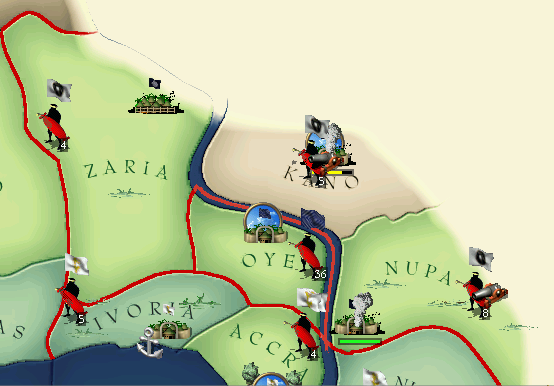 By late November, all the major cities of Hausa were surrounded by imperial troops. No armies had stood in our way. It was easy. 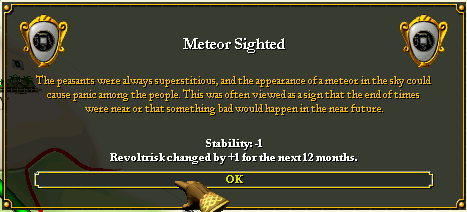 A little too easy. 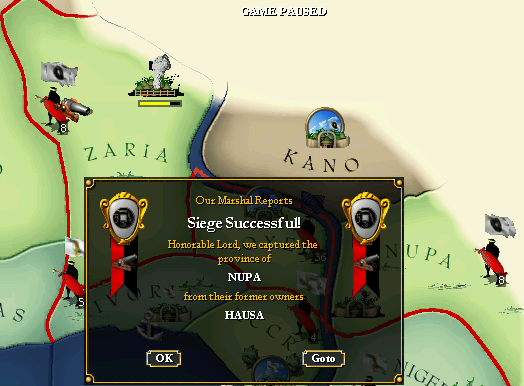 Nothing seemed to materialize as Nupa fell. A distant land from the core of the Songhai Empire, and interesting only for the Moslem population to be brought under the guidance of the true Caliph. 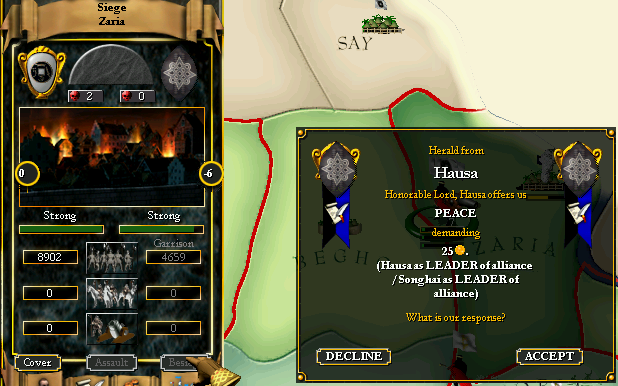 In early 1502, as Zaria slowly falls, an envoy of Hausa meets with Askia Mohammad. In return for a cessation of hostilities, he demands that the Songhai Empire pay 25 ducats. First Portugal and now this... Why is every ruler of every state insane but ours? To say that the Askia declined would be an understatement. 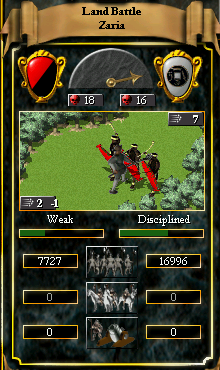 In response, it seems that the Hausa play their trump card. An army of 8,000 rebel forces emerge from the low planes and small woodlands of Zaria and converge upon the Jund Songhai’s encampment. They have the element of surprise, but are undisciplined and outnumbered. Still, the battle does not go easy. It is a bloody and gruesome thing, as 8,000 farmers bring their bladed implements to bear against our valiant soldier’s clubs and shields. In the end, the last, and only battle for Hausa takes thirteen days and costs 11,000 lives in all. But the rebel forces are finally routed by a thrust of Moroccan spearmen, and they flee to regroup. Hausa would not last long enough. 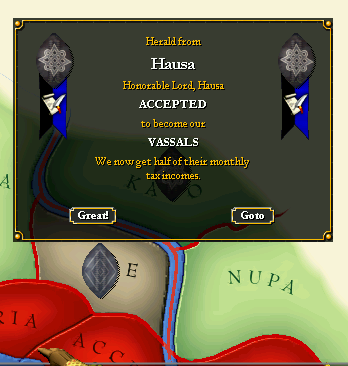 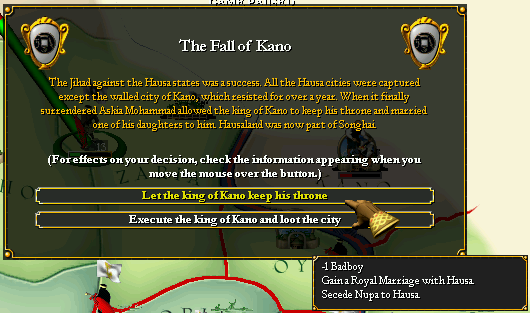 In late February of 1502, Hausa accepts Askia Mohammad’s terms. Zaria was added to imperial lands. The city-state Kano, and the last of the Hausa, must bow before the Askia and caliph Mohammad as vassals. In return, the lord of the Hausa would keep his life, the lands of Nupa, and a marriage into the great line of Askia Mohammad. His forgiveness, before the grace of Allah, to the other Moslem tribes would be the foundation of Askia Mohammad I’s Songhai, and would earn him the title Mohammad Ture the Great. 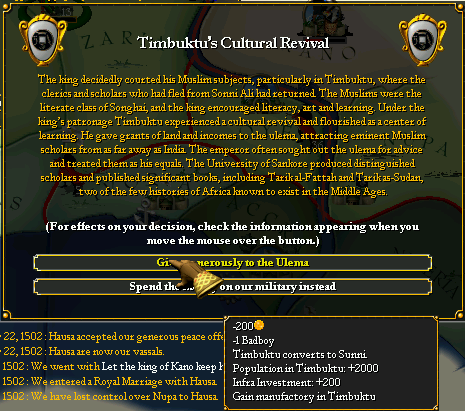 With the jihad over for now, the Askia turned his attention to the Moslems already a part of the Songhai Empire. He worked to undo the hideous pillage of Timbuktu and coaxed the Moslems who had once made the city great to return once more. There, Moslem culture flourished, and the Askia donated generously to assist it. A great university would begin to thrive in Timbuktu, and it would be the center of Songhai learning and culture for years to come. 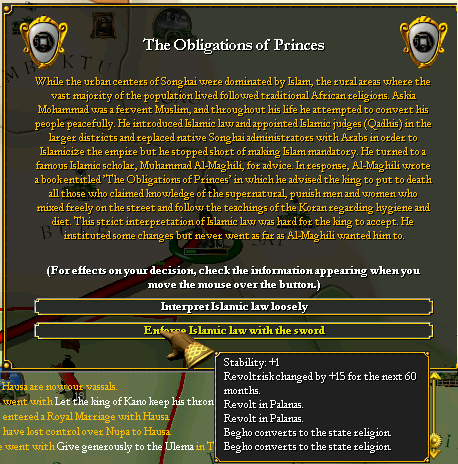 However, the generousness of Askia Mohammad and his Qadhis did not seem to be enough to convince the rural shamans and farmers of Songhai to convert to the true way. Anxious, the Askia turned to an Islamic scholar, Mohammad Al-Maghili. The response he got, The Obligations of Princes shook Askia Mohammad to his core. He looked deep within himself, and then up to Allah, for his answer. And in a fresh, mid-spring morning, standing amid the explosion of a crimson sunrise, the Askia knew his answer. A 13,000 Moslem infantry was gathered in Say and was marched south with Askia Mohammad at the head. Upon reaching Palanas, a stronghold for blasphemous ideas, 12,000 pagans were put to the sword. 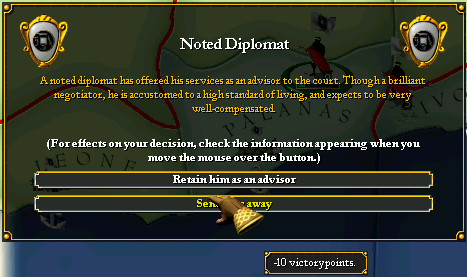 In the midst of the conflict, a noted Sunni diplomat from Egypt arrived offering Mohammad I his services in returning peace to the land, and slowly converting the unbelievers. The Askia had his revelation from Allah, and sent the man away. 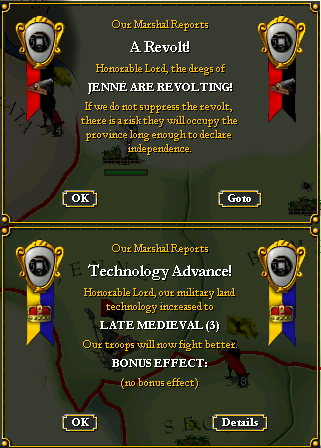 Unfortunately, the pagan unrest continued, but Mohammad’s Jund Songhai was becoming better organized as the learned from the pagans’ guerilla tactics. 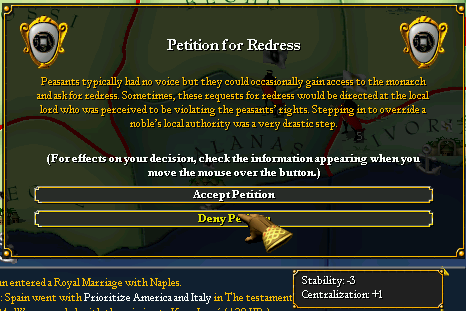 Soon, the Askia was faced with an interesting approach. The pagans were petitioning peaceably for an end to the forced conversions. The Askia took this sign and knew it. The pagans were less willing to fight. This could only mean that his forced conversion was coming to a head. Soon, the glorious light of the one true faith would shine on all of Songhai. 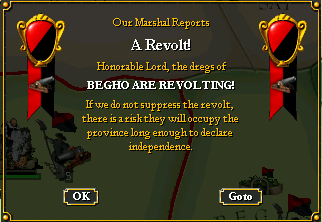 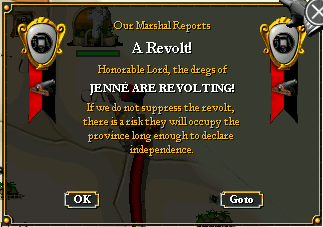 Soon... 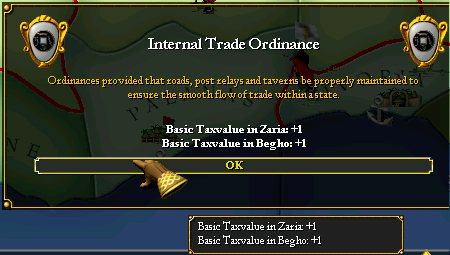 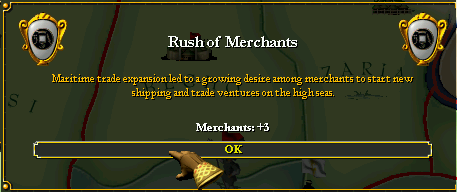 There was some good news, however. The cities, largely Moslem, were being improved by the Askia’s administration and the hard, efficient work of his Qadhis and their administrators. 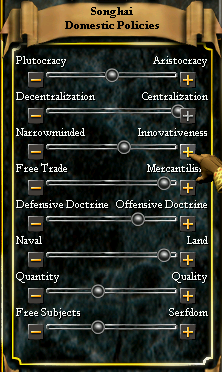 And the university in Timbuktu was flourishing. A second was established in Gao to foster even greater growth of Moslem innovation. 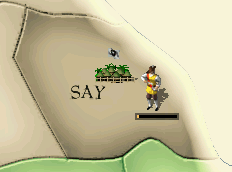 Tax collection was improved in Say in order to support these new reforms. 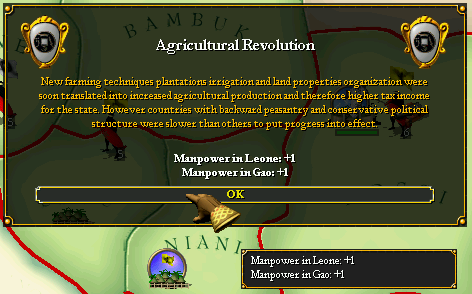 In order to make up for the loss of peasant farmers seemed to be driving the few farmers that remained to streamline their processes. In Leone and Gao particularly, small numbers of farmers, working in concert, began to farm larger and larger areas more effectively. People began to flock to the cities in these provinces. 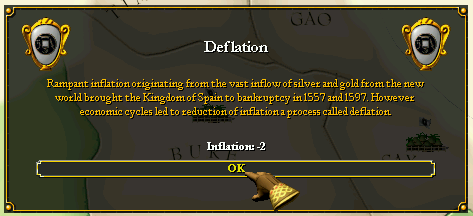 A series of economic reforms created in Timbuktu began to reduce the inflation that was slowly growing in Songhai. 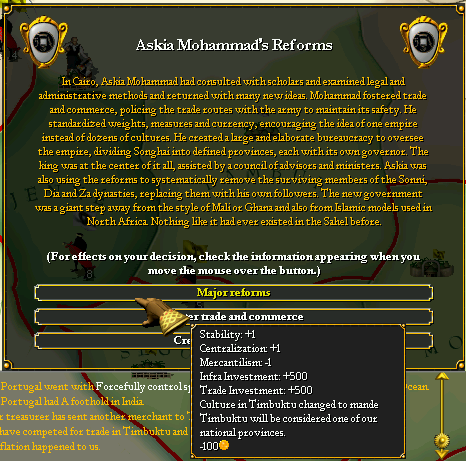 Finally tiring of his internal conversion of the people, the Askia left the Jund Songhai in the charge of a firm supporter and traveled to Cairo to look for solutions. What he returned with, however, was inspiration. He would recreate the imperial government in his own image. A firm monarchy with definitively subordinate mayors and governors of each province. He would remove the competing pseudo-royalty or nobility from other, formerly royal bloodlines and replace them with loyal Moslem supporters. It was the birth of a new style of government, an enlightened government, that Mohammad was sure would catapult the Songhai Empire into eminence over all the other nations of the area. However, one other catalyst was needed first. 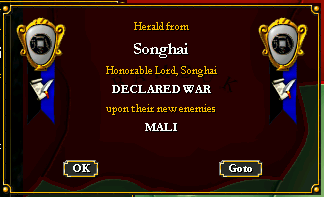
__________________
FAILURE IS
LEARNING TO ACCEPT THOSE THINGS I CANNOT CHANGE Last edited by The Kneumatic Pnight; 03-10-2008 at 10:07 PM. |
|
|
|
|
|
#8 |
|
SMARTASS
|
The fall of the Sorceror King of Songhai saddens me.
Does the game offer options in beating your opponents through econimic means? Because I wouldn't mind watching that.
__________________
Do geese see god? Everyone is an asshole. Including me. Especially including the double asshole who read this and nodded smugly. |
|
|
|
|
#9 |
|
Everfree
|
Not economic, though in Victoria, I can totally buy out countries if I do well enough. (HINT: I WON'T!) But what I will be doing is buying pieces of countries. Probably mostly with pieces of other countries.
But, there is diplomatic annexation, which is near on impossible if I'm not hugely better than the subject, so it takes a while until I get to do that. However, I will be doing some of that later. Anyway, I'll have an update up in a little bit. Bă V: 1512-1528 The End of a Beginning The war on Mali begins with Askia Mohammad’s gambit. 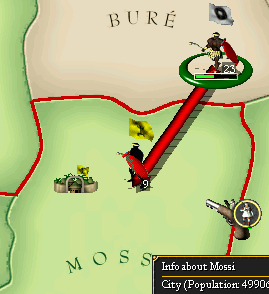 The Askia’s Royal Guard, fortified with four additional regiments to 23,000 men, will march on Mali’s newly gained, and weakly held territory of Mossi. They took it from the Ashanti when I wasn’t paying attention A double of the Askia has the glorious privilege of leading the Askia Royal Guard to victory. 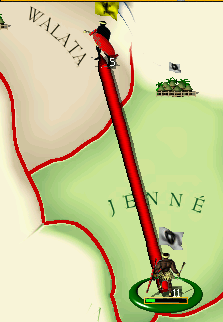 Meanwhile, in the east, the reliquary Jund Songhai marches on our claims in the west, Walata and Awadghost with the Askia at the head. Only 11,000 strong, and far from the Malinese capital, our foolish enemies should focus on the Askia Royal Guard, leaving the Jund Songhai to take our claims. 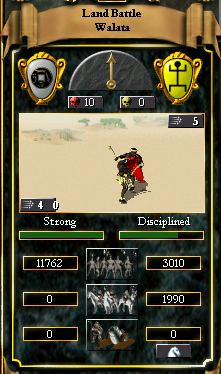 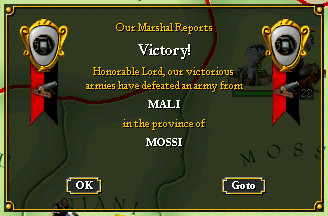 The battle in Walata lasts from the first of November to the ninth, before the small Mali regiment crumbles. The Jund Songhai has lost little more than 300 men. However, the battle for Mossi is an ordeal. Only 1,000 of the Askia Royal Guard are lost, but the battle lasts nearly a month as two armies clash, shield to club. 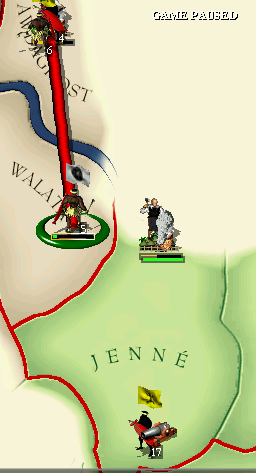 As the siege on Walata begins, the Askia takes 6,000 of the Jund Songhai and marches ahead. The mere 5,000 are more than enough to take Walata with our supporters, and soon moves to catch up. Behind us, the a Mali army sieges Jenné, but we will leave that until later. 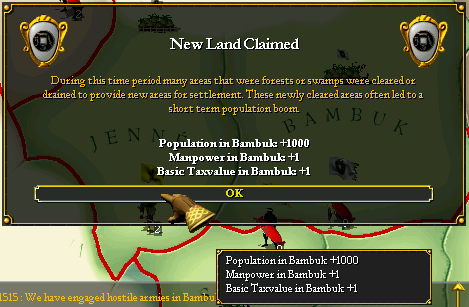 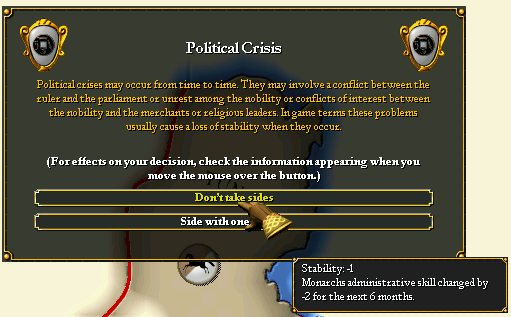 In Bambuk, refugees from Jenné and Mossi come and begin establishing farms. The population of Bambuk grows significantly. Bambuk nobles begin to argue, under threat of outright internal war, over who has rights to this new land in their serf. The Askia, at the front, cannot mediate in person, and soon the nobles begin to ignore him altogether. 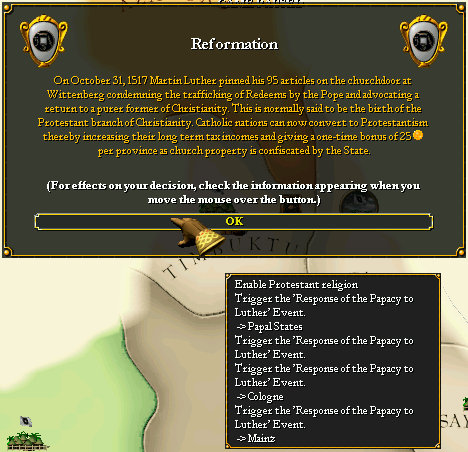 Word leaks from the north about the Reformation against the Catholic Church. Neither of these faiths are true, so we could care less how many of the heathens fight one another. 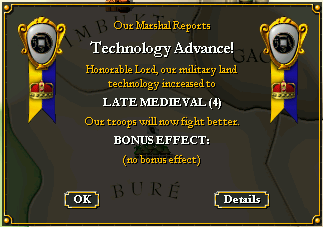 Askia Muhammad takes begins to plan for reforming the army with the lessons learned at the front lines. 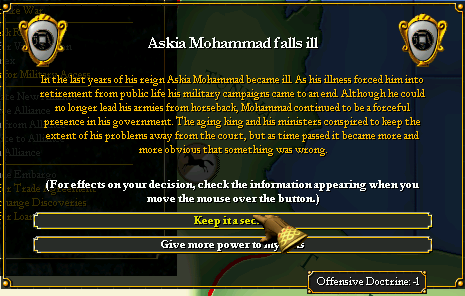 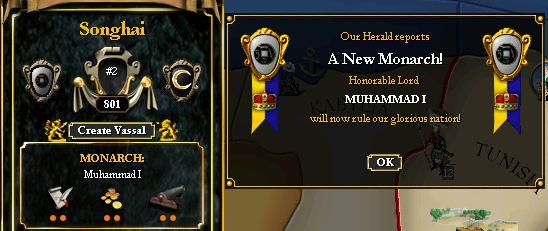 In August of 1519, the Askia is struck by an arrow fired by a would-be assassin. He will not fall to the poison, but he is a changed man. He retires from the front, significantly weakened by the ordeal, but hides it from his ministers. The nobles of Songhai cannot be allowed free reign over war-weakened monarch or state. He is forced to give up the war to take Mali, but manages to keep Walata and Awadghost. 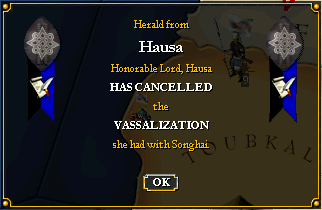 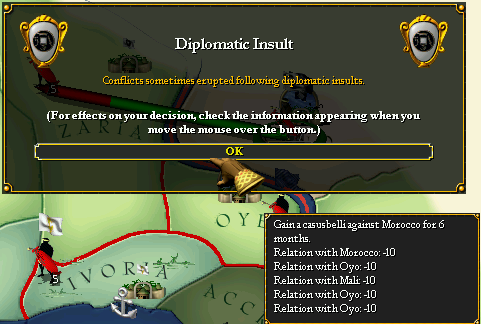 In November, two years later, Hausa, who has benefitted greatly from our benevolent vassalage decides to remove us entirely from their government. The Askia will not stand for such a violent rejection of his caliphship by Moslems over whom he has full, god-given right. To make matters worse, Morocco begins to insult the Askia Mohammad publicly about his lack of control over Hausa. This will not stand! 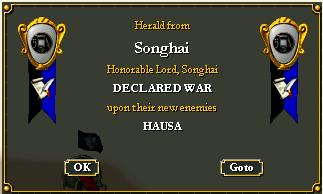 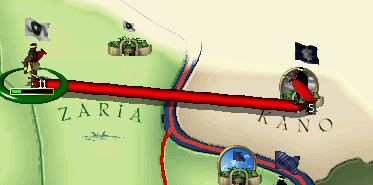 There need be no ploys this time. The Askia Royal Guard march alone on the Hausa capital. 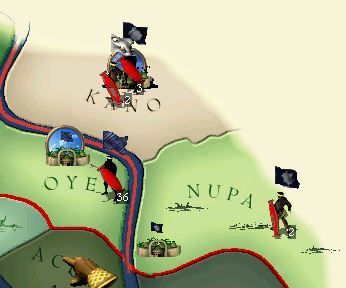 Without the Askia to lead them, the charge fails in the deaths of some 9,000 loyal Songhai. Their sacrifice will not be left in vain! As the royal guard retreats to Zaria, new conscripts are drawn for the second assault. An army of Haussans follow. 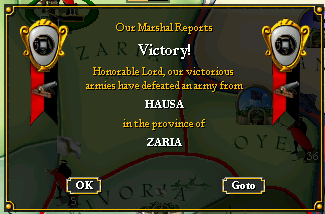 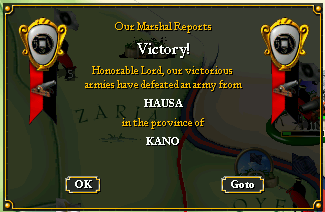 The tide remains locked at the Zaria border until a final charge lets the Askia Royal Guard through. The Hausan army scatters to the winds. 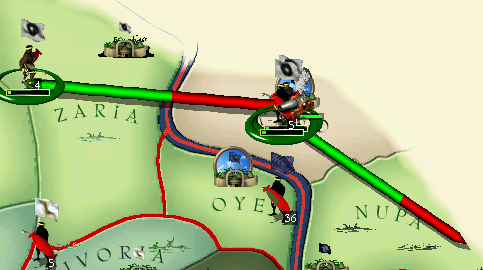 A peace-weakened Jund Songhai follows to secure Kano while half the Askia Royal Guard marches to the now-undefended Nupa. 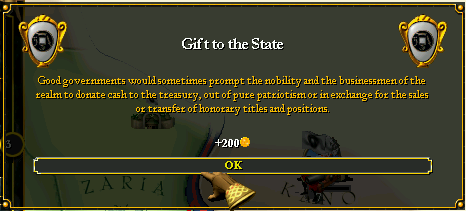 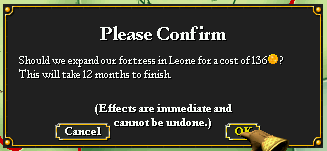 A high ranking Ulema of the Sunni church in Kano had been petitioning the ruler of Hausa to support the caliphate for years. Upon our sack of Kano, he offers us a generous sum to reinforce our efforts. He is to be thanked and honored for years, but his patronage is, ultimately unnecessary. In the province of Leone, we use the money to build a seafront fortress to guard the gold mines from invasion. The gates are graced by an image of Ulema Kemal, who served the caliph and god in the face of hardship and under the great temptation of a fortune. 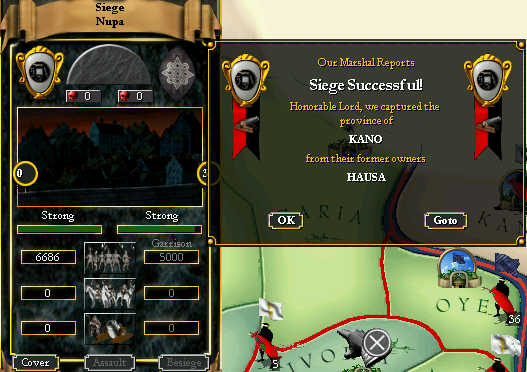 In January of 1524, Kano falls, and Nupa is under siege. 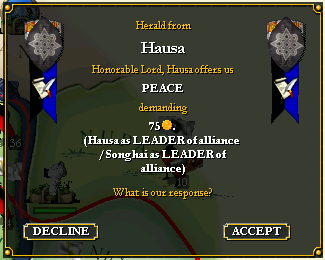 The lord of Hausa makes a peace demand so recklessly haughty that it verges on blasphemous. 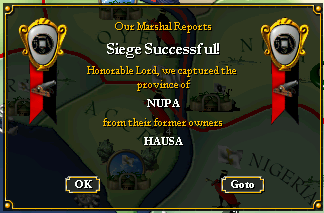 It is of little import. In January, Nupa falls, and Hausa has no more power. 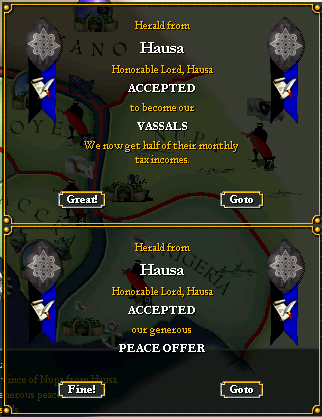 We take Nupa, as we should have done in the beginning, and allow Hausa vassalage once moreo, now under the rule of Ulema Kemal. 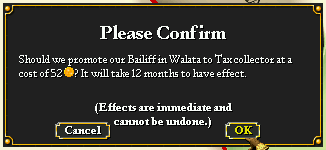 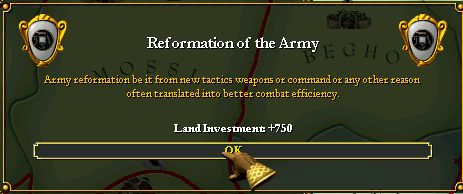 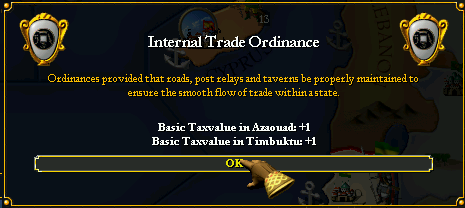 In peace now, and slowly weakening, Askia Mohammad Ture the Great spends the next three years attempting to improve the foundations of Songhai, as he had when his reign began. There were now only the villanous Mali who stood in the way of the Askia’s Caliphate over the region. The great jihads had been a success, even building upon the back of the blasphemer `Alī Ber. Truly, as they say, god has a plan for every man, large and small. And, now, god’s plan for Mohammad the Great was at an end. On a hot afternoon in late August of 1528, the great Askia slept at the foot of a venerable tree and the lord, our master and savior, took the Askia into his arms. The Askia was buried at the foot of that tree in a small, private ceremony, presided by his son, Ulema, and now Caliph and Askia Müsä. 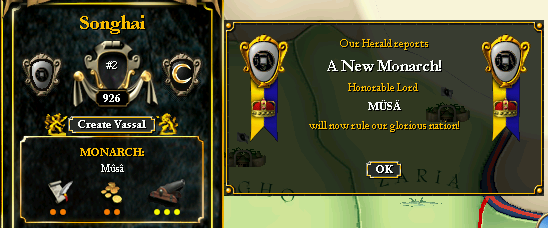
__________________
FAILURE IS
LEARNING TO ACCEPT THOSE THINGS I CANNOT CHANGE Last edited by The Kneumatic Pnight; 03-14-2008 at 10:53 PM. |
|
|
|
|
#10 |
|
Sent to the cornfield
Join Date: Apr 2004
Location: Las Vegas
Posts: 4,566








|
I can't believe I just read all that. Argh.
I would play that game, but I'm terrible at RTS. I can't ever figure out what all the little options are there for. Like civilization, what the fuck was up with all those peasants and corn stalks? I have no idea! |
|
|
| Thread Tools | |
| Display Modes | |
|
|